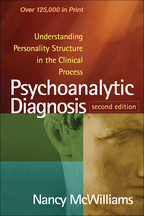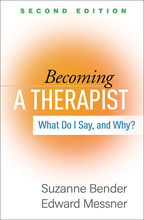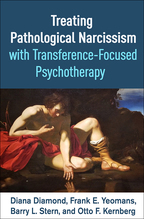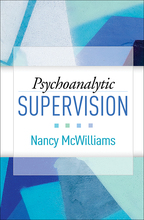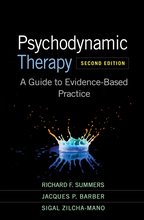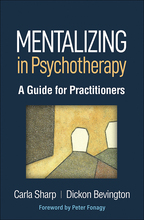How Psychotherapy Works
Process and Technique
Joseph Weiss
Hardcover
Hardcover
orderAugust 20, 1993
ISBN 9780898625486
Price: $51.00 224 Pages
Size: 6" x 9"
“...original and exciting....The most outstanding book in the field of psychoanalytical technique and process....Required reading for mental health professionals at all levels of training and experience.”

—Psychoanalytic Psychotherapy Review
“....This highly original book is recommended reading for mental health professionals at all levels of training.”

—The Psychoanalytic Quarterly
“Attractive and logically organized. It includes a feature rarely seen in texts discussing psychotherapy technique: empirical data supportive of the author's theories and technical prescriptions....An excellent book that meets its objectives and that will be quite useful both to therapists in training and experienced clinicians.”

—Doody's Annual Health Sciences Book Review
“Patients come to psychotherapy hoping to get better and look to therapists to help them feel safe by disconfirming conscious pathogenic beliefs. Here we have what seems like a remarkably simple idea. But what is revolutionary and most startling, Weiss's theory has been empirically tested and validated. Weiss ranges from his broad conceptualization of motivation and pathogenesis to the microanalysis of the clinical exchange. He demonstrates the impact of psychotherapy is in the effect of interventions, not on the intent or "purity" of technique. Reading HOW PSYCHOTHERAPY WORKS is a corrective educational experience.”

—Joseph Lichtenberg, M.D., Washington, D.C.
“This exciting and original book is a veritable treasure-house of practical understanding and clinical wisdom gained from Dr. Weiss's decades of psychoanalytic experience and amply supported by an impressive body of systematic research on the theories he has advanced. The lucidity and readability of this work is outstanding and should make this an excellent basic text for beginners in the field, as well as seasoned mental health practitioners. According to Weiss's therapy, psychopathology stems from pathogenic beliefs formed mainly in childhood from traumatic relationships. Weiss's theory of therapy and technique follows directly from his concept of psychopathology. He views psychotherapy as a process in which the patient works to disconfirm his pathogenic beliefs with the help of the therapist. Patients are powerfully motivated to disconfirm these beliefs because they are maladaptive and grim, and they produce much mental pain. Weiss conceptualizes the therapist's basic task as being one of helping patients to disprove their pathogenic beliefs, particularly their unconscious pathogenic beliefs, and to help patients pursue the goals that have been blocked by these overwhelmingly disturbing ideas.”

—Theo. L. Dorpat, M.D., F.A.P.A., Seattle, Washington
“In HOW PSYCHOTHERAPY WORKS, Joseph Weiss offers an experience-near, relational, and rational approach to psychoanalytic therapy that is based on empirical research into the therapeutic process. A breath of fresh air in a field dominated by unsupported doctrine, this excellent text will serve as an invaluable guide to all students of psychotherapy.”

—Robert D. Stolorow, Ph.D., Training and Supervising Analyst, Institute of Contemporary Psychoanalysis
“....This highly original book is recommended reading for mental health professionals at all levels of training.”

—Theo L. Dorpat in The Psychoanalytic Quarterly
“This book is recommended for educators and practitioners wanting to understand and make use of a psychoanalytic approach with clients.”

—David A. Jenkins, Ph.D., The American Journal of Family Therapy
“This book summarizes decades of clinical teaching, research, and study in a form that is readily accessible to the working psychoanalyst....The body of work presented is important and should be taken seriously.”

—Stephen F. Bauer, M.D., in Psychoanalytic Books
“This original and exciting book on psychotherapy process and technique should become, in a short time, the most outstanding book in the field of psychoanalytical technique and process....The readability of this eminently practical volume makes it required reading for mental health professionals at all levels of training and experience.”

—Theo L. Dorpat, M.D., in The Psychoanalytic Psychotherapy Review
—Psychoanalytic Psychotherapy Review
“....This highly original book is recommended reading for mental health professionals at all levels of training.”
—The Psychoanalytic Quarterly
“Attractive and logically organized. It includes a feature rarely seen in texts discussing psychotherapy technique: empirical data supportive of the author's theories and technical prescriptions....An excellent book that meets its objectives and that will be quite useful both to therapists in training and experienced clinicians.”
—Doody's Annual Health Sciences Book Review
“Patients come to psychotherapy hoping to get better and look to therapists to help them feel safe by disconfirming conscious pathogenic beliefs. Here we have what seems like a remarkably simple idea. But what is revolutionary and most startling, Weiss's theory has been empirically tested and validated. Weiss ranges from his broad conceptualization of motivation and pathogenesis to the microanalysis of the clinical exchange. He demonstrates the impact of psychotherapy is in the effect of interventions, not on the intent or "purity" of technique. Reading HOW PSYCHOTHERAPY WORKS is a corrective educational experience.”
—Joseph Lichtenberg, M.D., Washington, D.C.
“This exciting and original book is a veritable treasure-house of practical understanding and clinical wisdom gained from Dr. Weiss's decades of psychoanalytic experience and amply supported by an impressive body of systematic research on the theories he has advanced. The lucidity and readability of this work is outstanding and should make this an excellent basic text for beginners in the field, as well as seasoned mental health practitioners. According to Weiss's therapy, psychopathology stems from pathogenic beliefs formed mainly in childhood from traumatic relationships. Weiss's theory of therapy and technique follows directly from his concept of psychopathology. He views psychotherapy as a process in which the patient works to disconfirm his pathogenic beliefs with the help of the therapist. Patients are powerfully motivated to disconfirm these beliefs because they are maladaptive and grim, and they produce much mental pain. Weiss conceptualizes the therapist's basic task as being one of helping patients to disprove their pathogenic beliefs, particularly their unconscious pathogenic beliefs, and to help patients pursue the goals that have been blocked by these overwhelmingly disturbing ideas.”
—Theo. L. Dorpat, M.D., F.A.P.A., Seattle, Washington
“In HOW PSYCHOTHERAPY WORKS, Joseph Weiss offers an experience-near, relational, and rational approach to psychoanalytic therapy that is based on empirical research into the therapeutic process. A breath of fresh air in a field dominated by unsupported doctrine, this excellent text will serve as an invaluable guide to all students of psychotherapy.”
—Robert D. Stolorow, Ph.D., Training and Supervising Analyst, Institute of Contemporary Psychoanalysis
“....This highly original book is recommended reading for mental health professionals at all levels of training.”
—Theo L. Dorpat in The Psychoanalytic Quarterly
“This book is recommended for educators and practitioners wanting to understand and make use of a psychoanalytic approach with clients.”
—David A. Jenkins, Ph.D., The American Journal of Family Therapy
“This book summarizes decades of clinical teaching, research, and study in a form that is readily accessible to the working psychoanalyst....The body of work presented is important and should be taken seriously.”
—Stephen F. Bauer, M.D., in Psychoanalytic Books
“This original and exciting book on psychotherapy process and technique should become, in a short time, the most outstanding book in the field of psychoanalytical technique and process....The readability of this eminently practical volume makes it required reading for mental health professionals at all levels of training and experience.”
—Theo L. Dorpat, M.D., in The Psychoanalytic Psychotherapy Review


